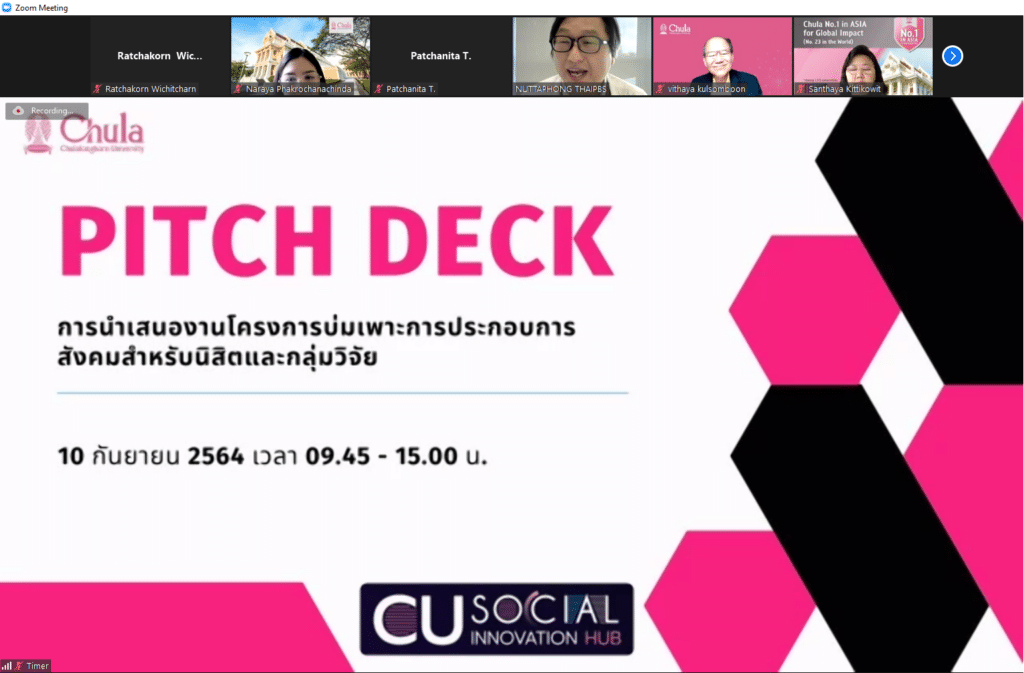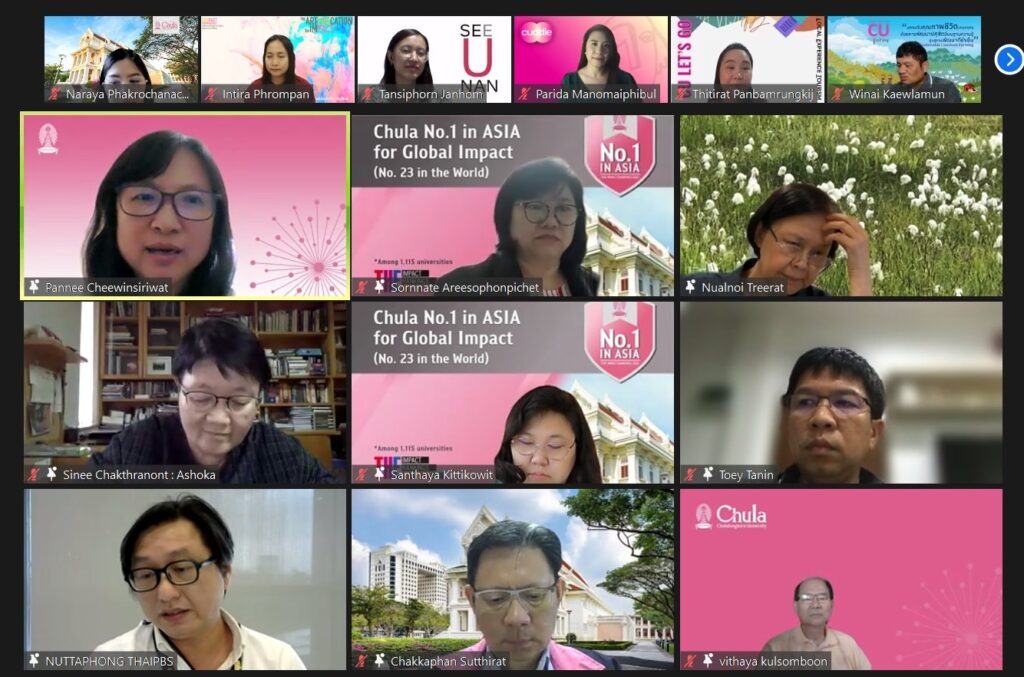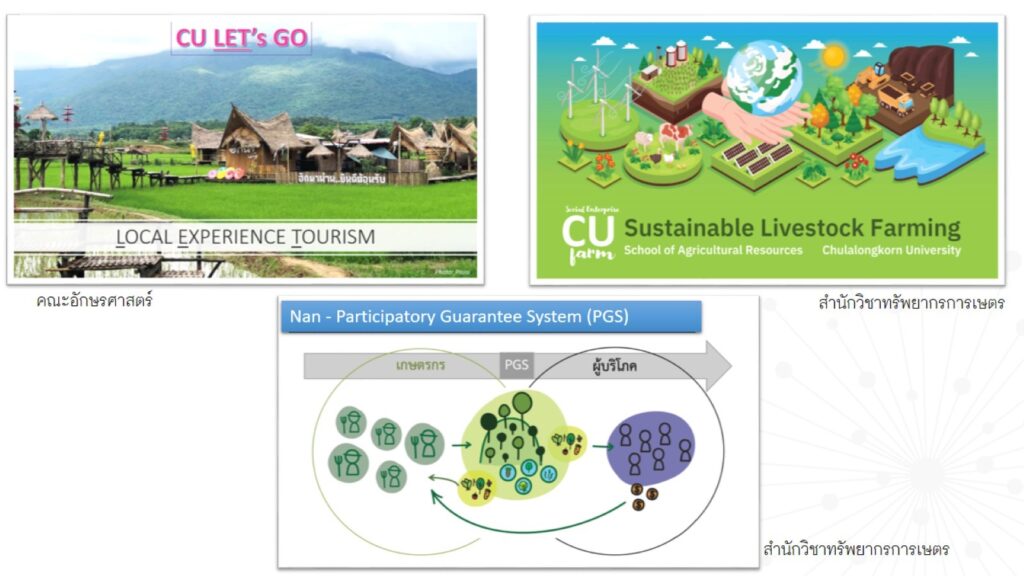Chula reveals the success of CU SiHub as an incubator for faculty members, researchers, and students to drive research in the social sciences, arts and humanities to create social innovation businesses and social enterprises toward a sustainable society.
When it comes to innovation, many people think about artificial intelligence (AI), and modern technologies, but aside from that there is also a form of “social innovation” that is lesser-known, despite its equally crucial role in national development alongside science and technology.
Assistant to the President of Chulalongkorn University and Director-General of CU SiHub, Assoc. Prof. Dr. Pannee Cheewinsiriwat elaborated on the meaning and importance of social innovation, “social innovation may not be a tangible piece of work, but it is a modern method, idea, and thinking process that’s valuable, meets societal needs and improves the people’s quality of life.”
Recognizing the importance of innovation research and development for the sustainable development of a country based on the Sustainable Development Goals (SDGs), Chula, has therefore, established Chulalongkorn University Social Innovation Hub (CU SiHub) in 2020 to serve professors and researchers in social sciences, arts and humanities, along with the CU Innovation Hub (CU iHub), what concentrates on innovative research, mostly in the sciences, with the potential to expand into businesses and startups.
“This center is a space where researchers and students from all disciplines who are interested in community and social development can exchange knowledge, invent social innovations to help improve the community’s quality of life and meet the country’s sustainable development goals.”
CU SiHub and its supporting role for researchers in the social sciences, humanities, and arts
In addition to being a space for knowledge exchange for professors, researchers, and students who are keen on social innovation, the Center focuses on supporting research projects that can continue to bring about tangible and sustainable community development through revolving income generation for the research groups and the community.
“The proceeds may be divided into two parts: income from donations such as crowdfunding or companies supporting CSR projects. The other may come from the sale of innovative products and/or services from the research project itself, for example, the Creative Tourism Research Project, Nan Province that organizes creative tourism trips to generate income for the community,” Dr. Pannee said.
The 2 groups of research projects the Center supports are social innovation for the community, and social innovation for social enterprises.
Social innovation for the community
Chula SiHub gives funding support or seed funds for researchers to apply their innovations to the community. After that, the research group can use the work as a showcase for further extension or funding, to seek external cooperation to be able to continue to do so in the future. This will have a social impact on the community.
“For example, as part of the research on “Pad Thai” by The Multicultural Studies and Social Innovation Center, The Institute of Asian Studies, researchers made a short film entitled “Pad Thai: The Secret Recipe” aired on Thai PBS Television. The Ministry of Culture also screened it in the Philippines at the Montanosa Film Festival (MFF) on March 19-27 this year to launch Thai food culture soft power to the global stage through entertainment. In addition to Pad Thai: The Secret Recipe, Thai PBS recently entered into a partnership with the Institute of Asian Studies to work on other subjects,” said Prof. Dr. Pannee.
Besides the research on “Pad Thai“, CU SiHub supports various other social innovation projects that include:
|
NO. |
SOCIAL INNOVATION FOR THE COMMUNITY |
RESEARCH |
HEAD RESEARCHER |
|---|---|---|---|
|
1 |
Teach scriptwriting for plays, and theatre acting to students in the community to foster their creativity |
Research title: Social innovation with theatrical art The development of theatre educators and media prototypes led to the creation of a spatial identity through school teachers and students. |
Prof. Dr. Pornrat Damrhung Faculty of Arts |
|
2 |
3 Pilot films “Muay Thai”, “Yan Lipao Basketry”, and “The Phi Ta Khon (Ghost Festival)” |
Research title: Thai culture exported through entertainment Create play scripts based on Thai culture research to raise public awareness and understanding of the value of Thai culture in a new way. |
Dr. Dollaya Tiantong The Multicultural Studies and Social Innovation Center The Institute of Asian Studies |
|
3 |
Tamsang-Tamsong |
Research title: Tamsang-Tamsong (Delivery on Demand): Social Innovation for Solidarity Economy Solidarity community development through a community-run food delivery platform, which has now been extended to many areas. |
Mr. Akkanut Wantanasombat The Institute of Asian Studies |
|
4 |
Improve indigenous chicken farming in Nan Province |
Research title: Development of prototypes for indigenous poultry production by analyzing value chains and research to drive community enterprises. Improvement of small indigenous chicken farmers, and knowledge transfer to develop a new generation of farmers. |
Asst. Prof. Dr. Winai Kaewlamun School of Agriculture Resources |
|
5 |
Platforms to present various services of small entrepreneurs in the area |
Research title: Digital map to promote a community economy and enhance the capacity of small and medium-sized entrepreneurs Platforms to present various services of small entrepreneurs in the area. |
Asst. Prof. Dr. Ruttiya Bhula-Or College of Population Studies |
Social Innovation to Social Enterprise
Promoting social innovation to social enterprises is another important mission of CU SiHub to show researchers in the social sciences, humanities, and arts that these fields of knowledge can evolve into viable businesses.
The center has organized two coaching sessions for professors, researchers, and students to cultivate business model design. The content of the course focuses on the way of thinking and skills such as:
- Think and understand what social problems need to be solved.
- Who are the stakeholders?
- Using Theory of Change to test if the innovation can solve the problem.
- Encourage critical thinking and thinking outside the box
“After the coaching, the Center will organize a Pitch Deck for students and research groups to present their business models and invite experts in that area to give their opinion for further development before pilot testing the social innovation prototypes,” Dr. Pannee explained.


In the past, CU SiHub has incubated first-generation researchers of which 7 social innovation projects are now under business model prototypes testing:
|
NO. |
SOCIAL ENTERPRISE MODEL |
DETAILS |
HEAD RESEARCHER |
|---|---|---|---|
|
1 |
Data Journalism: Data Telling Platform |
People development and networking platforms connect the communications industry through information and social deliberation. |
Assoc. Prof. Pijitra Suppasawatgul Faculty of Communication Arts |
|
2 |
Cuddle: The Storytelling Academy |
People Development Platform for Storytelling and Connecting with the Private Sector |
Asst. Prof. Dr.Parida Manomaiphibul Department of Drama Arts, Faculty of Arts |
|
3 |
Tamsang-Tamsong: Social and Solidarity Economy Platform |
A food delivery platform that focuses on creating jobs and supporting the community. |
Mr. Akkanut Wantanasombat The Institute of Asian Studies |
|
4 |
CU Let’s go: The Local Experience Tourism |
A platform to promote creative and experiential community tourism. |
Asst. Prof. Dr. Thitirat Panbamrungkij Department of Geography, Faculty of Arts |
|
5 |
CU PGS Nan: The Sustainable PGS Farming |
Watershed forest restoration through sustainable farming systems to improve the income and quality of life of farming households |
Asst. Dr. Tansiphorn Janhom School of Agriculture Resources |
|
6 |
CU Farm: The Sustainable Livestock Farming |
Sustainable farm systems create jobs in husbandry and increase farmers’ incomes. |
Asst. Prof. Dr. Winai Kaewlamun School of Agriculture Resources |
|
7 |
EduPACT: The Art Education for Impact |
Design and use of artistic materials for the alleviation and reduction of conditions affecting the mental health of children and the elderly. |
Asst. Prof. Dr. Intira Phrompan Faculty of Education |


Future Directions Social Innovation for Sustainability
Though in its fledgling stage, and the majority of recent events were online due to the COVID-19 pandemic, the CU SiHub has imprinted the term “social innovation” in the mind of the Chulalongkorn community.
“The number of professors, researchers, and students from various faculties has almost doubled from the first batch with 7 research groups. For the second batch that’s about to be organized, there are as many as 12 research groups interested in applying. We want everyone to know and be interested in exchanging knowledge and creating social innovation together in these areas.”
Dr. Pannee concluded that this year the Center will organize more exhibitions and events for more interested parties to come and use the Center’s space for knowledge exchange. In the future, there are plans to organize training on social innovation best practices from local and international researchers and agencies, as well as social impact assessment for professors, researchers, and students with a focus on research or social innovation that meets the SDGs (Sustainable Development Goals).
CU Social Innovation Hub
Ground floor, Visid Prachuabmoh Building, Chulalongkorn University
Email: [email protected]


